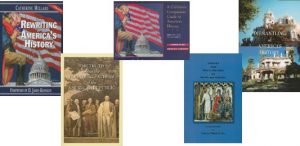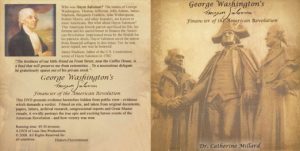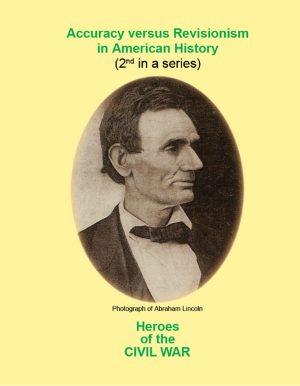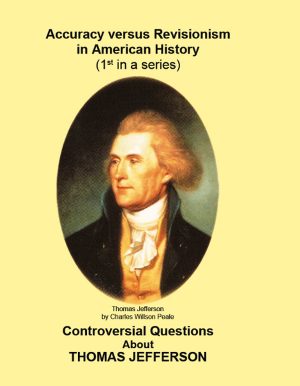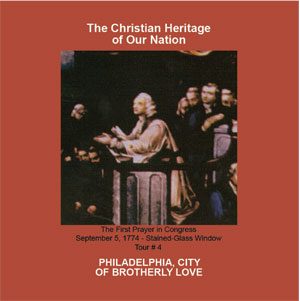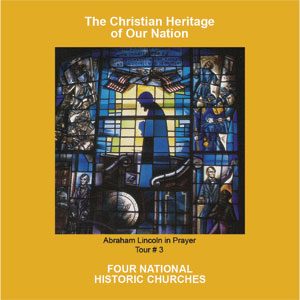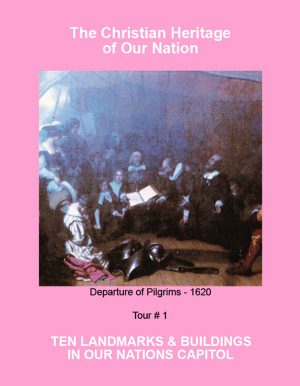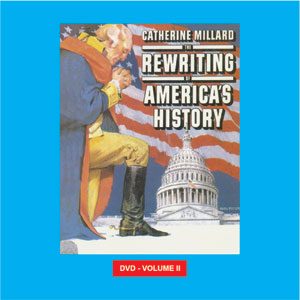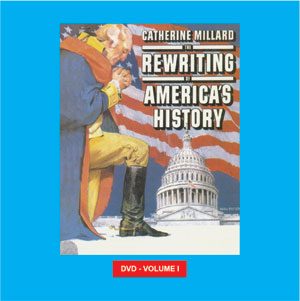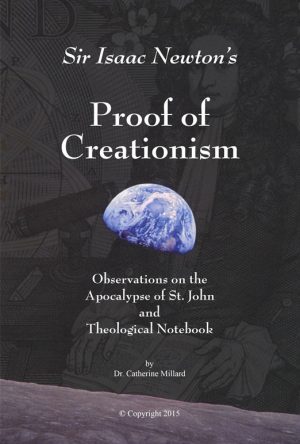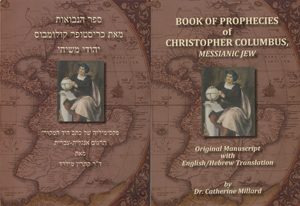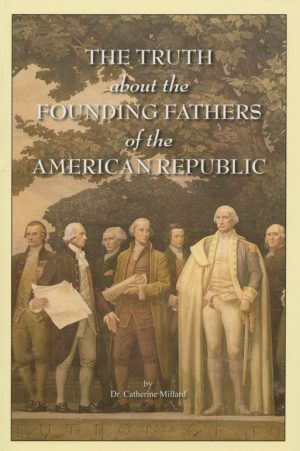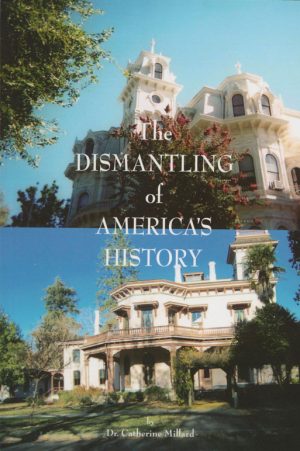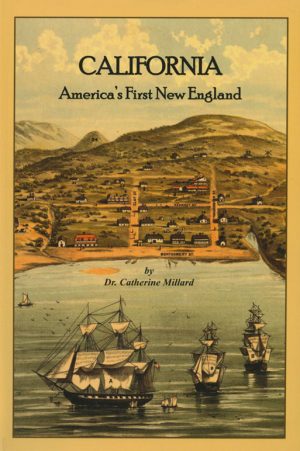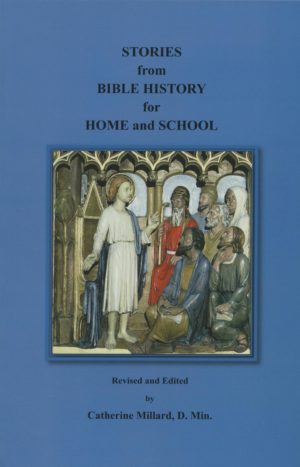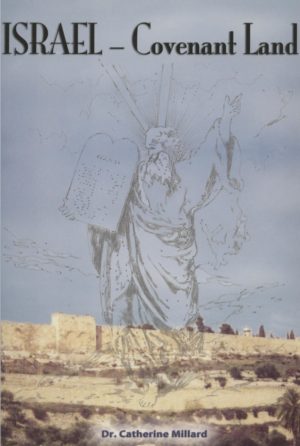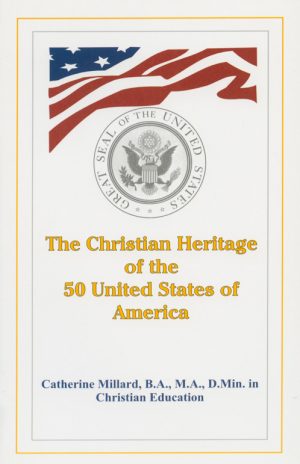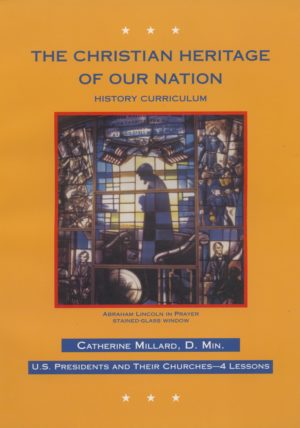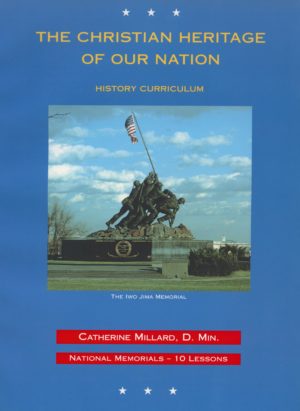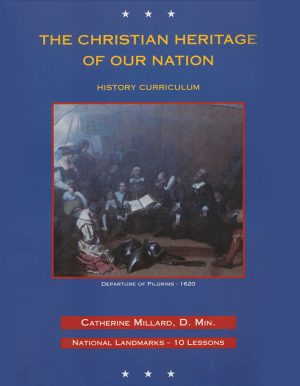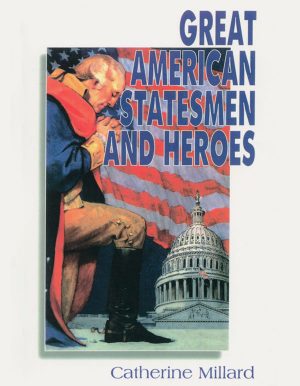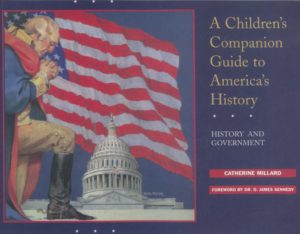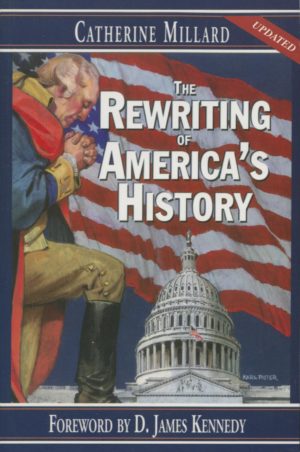Fact or fiction?
When the two are combined, the reader could have what one might call faction – neither one nor the other.
Just the facts, please. There are enough facts without having to manufacture cute little fictional stories about our American heroes. We don’t need to add more to the myths abounding in our land today.
When the enemy of truth would seek to deceive, he can do it from two extremes:
i) outright lies by godless historians, or
ii) the Church offering fictionalized attempts to entertain a T.V.– oriented
generation; promoting myths or quoting without credible sources.
Students caught between these two extremes are tempted to discard both versions, as they can’t believe either one.
Exploring American History textbook
One such textbook is entitled Exploring American History, by Michael J. McHugh and D.H. Montgomery, published by the Christian Liberty Press, Arlington Heights, Illinois in 1992. In their Introduction to this book, the writers claim:
i)”…to present accurately these facts and principles in the lives of the chief founders and builders of America?”
ii) “The dramatic, the picturesque, the personal, appeal powerfully to the young mind, leading it to see the past as a living present, and to think the thoughts and experience the feelings of people who now live only in their words and deeds.”
iii) “the words quoted literally in this book are enclosed in double quotation marks; those quoted in substance only are enclosed in single marks; while those attributed by the writer to different speakers have no marks.”
We will review how this text presents the life of George Washington.
Washington’s Youth
Example One:
“…He was a well meaning boy, but he had a hot temper, and at times his blue eyes flashed fire.” (page 109)
This is an unsubstantiated attack on Washington’s character. Claiming that he was hot-tempered as a youth is completely contrary to facts borne out by those who knew him and lived in his era:
He was incapable of fear, meeting personal dangers with the calmest unconcern. Perhaps the strongest feature in his character was prudence, never acting until every circumstance, every consideration, was maturely weighed; refraining if he saw a doubt, but, when once decided, going through with his purpose, whatever obstacles opposed. His integrity was most pure, his justice the most flexible I have ever known, no motive of interest, or consanguinity, or friendship or hatred, being able to bias his decision. He was in every sense of the words, a wise, a good, and a great man.1
Thomas Jefferson, President,
United States of America
…the life of our Washington cannot suffer by comparison with those of other countries who have been most celebrated and exalted by fame… Malice could never blast his honor, and envy made him a singular exception to her universal rule… His example is now complete, and it will teach wisdom and virtue to magistrates, citizens and men, not only in the present age, but in future generations, as long as our history shall be read… 2
John Adams, President,
United States of America
And again,
Washington, the clam intrepid chief, the disinterested friend, first father and temporal savior of his country under Divine protection and direction… I am disposed to lose sight of all but Washington: matchless man! At all times he acknowledged the providence of God, and never was he ashamed of his Redeemer.3
Reverend Francis Asbury,
Pioneer of American Methodism
Example Two:
“…When the boys played “soldier” they liked to have “Captain George” as commander. When he drew his wooden sword and shouted “Come on!” they would all rush to battle with a wild hurrah. Years afterward, when the real war came, and George Washington drew his sword in real battle, some of his school companions may have fought under their old leader.” (page 109)
This is an example of fiction.
Example Three:
Similar to the cherry tree episode, which has been proven to originate from a two-page, 1932 publication issued by Stanford University Press in San Francisco, and falsely attributed to Mason L. Weems’ 1800 biography of George Washington (where no mention is made of a cherry tree); George kills his mother’s favorite colt:
The Great Battle With the Colt, and What Came of It
Once, however, Washington had a battle of a different kind. It was with a high-spirited young horse which belonged to his mother. Nobody had ever been able to do anything with that colt, and most people were afraid of him. Early one morning, George and some of his brothers were out in the pasture. George looked at the colt prancing about and kicking up his heels. Then he said, “Boys, if you’ll help me put a bridle on him I’ll ride him.” The boys managed to get the colt into a corner and to slip on the bridle. With a leap, George seated himself firmly on his back. Then the fun began. The colt, wild with rage, jumped, plunged, and reared straight up on his hind legs, hoping to throw his rider off. It was all useless; he might as well have tried to throw off his own skin, for the boy stuck to his back as though he had grown there. Then, making a last desperate bound into the air, the animal burst a blood vessel and fell dead. The battle was over, George was victor, but it had cost the life of Mrs. Washington’s favorite colt.
When the boys went in for breakfast, their mother, knowing that they had just come from the pasture, asked how the colt was getting on. “He is dead, madam,” said George. “I killed him.” “Dead!” exclaimed his mother. “Yes, madam, dead,” replied her son. Then he told her just how it happened. When Mrs. Washington heard the story, her face flushed with anger. Then, waiting a moment, she looked steadily at George, and said quietly, “While I regret the loss of my favorite horse, I rejoice in my son, who always speaks the truth.” (pages 109, 110)
This is an example of fiction.
Young Manhood
Example Four:
“…a band of Indians, who stopped and danced a war dance for them. The music was not very good… but the dancing could not be beat. The Indians leaped into the air, swung their hatchets, gashed the trees, and yelled until the woods rang.” (page 112)
Example Five:
Major Washington dressed himself like an Indian… ” (page 113)
We can find no original source documentation for either of these Indian stories.
Example Six:
“When they reached the Allegheny River, they found it full of floating ice. They worked all day and made a raft of logs. As they were pushing their way across with poles, Washington’s pole was stuck by a big piece of ice which jerked him out into water ten feet deep. A short time later the two men managed to get to a little island, but as there was no wood on it, they could not make a fire. The weather was bitterly cold, and Washington, who was soaked to the skin, had to take his choice between walking around all night, or trying to sleep on the frozen ground in his wet clothes.” (page 114)
Common sense tells us that a person soaked to the skin in a frozen river, stranded on an island with no wood, does not survive by walking around all night.
Example Seven:
“Colonel Washington fought like a man who liked to hear the bullets whistle past his ears (as he said he did)…” (page 115)
We can find no original source documentation for this quote attributed to George Washington. However, in his pastor Mason L. Weem’s 1800 biography of Washington, a different, heroic and godly account of Colonel Washington is given:
In 1753, the French and Indians began to make inroads on our western frontiers along the Ohio…. Accompanied by an interpreter and a couple of servants, Washington set out on his expedition, which was, from start to pole, as disagreeable and dangerous as anything Hercules himself could have wished. Soaking rains, chilling blasts, roaring floods, pathless woods, and the mountains clad in snows opposed his course; but opposed in vain. The glorious ambition to serve his country imparted an animation to his nerves, which rendered him superior to all difficulties, and happier far than the little souls he left behind in Williams burg….Returning homewards, he was waylaid and shot at by a French Indian, and although the ruffian was not 15 steps distant when he fired at him, yet not even so much as the smell of lead passed on the clothes of our young hero; so true still is the promise on record in the good old book, viz. “The hosts of God encamp around the dwellings of the just; And mighty angels wait on all, who in His mercy trust… With this handful a brave fellows, Colonel Washington, not yet 23, boldly pushed out into the Indian country and there, for a considerable time, Hannibal-like, maintained the war against three times the number of French and Indians…Hence one of his European friends advised him to quit a scene of danger to which he had such slender ties, and fly with him to the safe and pleasant shores of Europe. “What,” replied Washington, “shall I forsake my Mother, because she is in danger?” The other observed that Colonel Washington had not perhaps duly appreciated the pleasures he was renouncing, the dangers he was incurring, “God forbid,” rejoined Washington, “that I should ever appreciate pleasure, opposite to duty, or shrink from dangers when my country calls, No! I had rather suffer with her, than reign with her oppressors…” For seven long years he held the fields of iron war, with no dainties, but common soldiers’ fare; no music but clashing arms and thundering guns; no pleasures, but his toils and watching for us. At any period of this long conflict, he might no doubt, have exchanged our liberties for myriads of shining gold, or highest feats of purpled honor. But Washington was not born to blast the hope of millions…4
Example Eight:
Crossing the Delaware
“…It looked at one time as though our men would all be taken prisoners; but Washington managed to seize a number of small boats on the Delaware River and get across into Pennsylvania. As the British had no boats, they could not follow… On Christmas night (1776) he took many boats, filled them with soldiers, and secretly crossed over to New Jersey. The weather was intensely cold, the river was full of floating ice, and a furious snowstorm set in. Many of our men were ragged and had only old, broken shoes. They suffered terribly, and two of them were frozen to death. However, General Washington never heard one complaint from these brave men.” (page 123)
In Exploring American History, only two paragraphs are devoted to this monumental feat – crossing the Delaware River to New Jersey on Christmas, 1776.
However, Mason L. Weems’ famous biography of George Washington describes this amazing task, and God’s miraculous intervention as follows:
…the British with an infinite superiority of force, after having defeated the Americans with great loss, were investing the slender remains of their army, and had actually broke ground within six hundred yards of the little redoubt that feebly covered their front. Soon as it was dark, Washington ordered the troops to convey their baggage and artillery to the waterside, whence it was transported over a broad ferry all night long, with amazing silence and order. Providentially, a thick fog continued next morning ’till ten o’clock; when that passed away, and the sun broke out, the British were equally surprised and enraged to see the rear guard with the last of the baggage, in their boats, and out of all danger…
Towards the close of this trying campaign, it is a fact that Washington had not 3,000 men; and even these were so destitute of necessaries, that nothing but their love and veneration for him kept them together. And with this handful he had to oppose a victorious army, of nearly forty thousand veterans! But Jehovah, the God of Hosts, was with him; and oft’ times, in the ear of the slumbering hero, His voice was heard, “fear not, for I am with thee; be not dismayed, for I am thy God.”
Hence, under all the disheartening circumstances of this campaign, Washington not only kept up his own spirits, but cheered those of his drooping comrades… Firm as the iron rudder-bands that maintain the course of the ship in her trembling flight over raging seas, so firmly did Washington cleave to his countrymen…5
These are amazing episodes of Divine intervention in the Revolutionary War. Washington referred to this. Note the following letter he wrote on August 20, 1778 to his Virginian friend, Thomas Nelson:
The Hand of Providence has been so conspicuous in all this (the course of the war) that he must be worse than an infidel that lacks faith, and more wicked that has not gratitude to acknowledge his obligations; but it will be time enough for me to turn Preacher when my present appointment ceases.
And again, it was summed up by Washington in his First Inaugural Address:
…It would be peculiarly improper to omit in this first official act my fervent supplications to that Almighty Being who rules over the universe, who presides in the councils of nations, and whose providential aids can supply every human defect that His benediction may consecrate to the liberties and happiness of the people of the United States…No people can be bound to acknowledge and adore the Invisible Hand which conducts the affairs of men more than those of the United States. Every step by which they have advanced to the character of an independent nation seems to have been distinguished by some token of providential agency…6
Exploring American History, like many others, gives fictionalized accounts in an attempt to entertain children, and it establishes myths, thus watering down the noble deeds which were the outgrowth of our heroic founders’ godly lives.
II. Boys and Girls of Colonial Days textbook
Boys and Girls of Colonial Days by Carolyn Sherwin Bailey was published in 1917 by A. Flanagan Company. It was republished in 1990 by Christian Liberty Press; again by Carolyn Sherwin Bailey, but revised and edited by Michael J. McHugh.
In it, the editor removed three chapters, including one called “The Jack-‘O-Lantern Witch.” This highly questionable chapter would obviously be objected to by Christian parents. It is the story of a grandmotherly figure, who had been accused of being a witch of Salem, but is saved by children who stand up in her defense.
It is very questionable that three chapters were added to Carolyn Sherwin Bailey’s book. Who wrote them? Were they added in 1990 and attributed to Bailey who had published her book in 1917? Were they written by the editor, Michael J. McHugh?
The last three chapters were written focusing on the George Washington era. The most telling example of its inferiority as history is the last page of the book which includes a picture of George Washington and a statement that exemplifies his “noble spirit” by his compassion for animals! It certainly sounds as though the writer was one influenced by the modern humanistic thinking regarding animal rights:
The noble spirit of George Washington can be seen in the way he showed concern and compassion for common animals. No person should ever think that he can become so high and mighty that his obligation to show kindness to God’s creatures is no longer necessary. (page 124)
Some Christian textbook publishers have chosen a neutral stance in regard to whether or not our great leaders were motivated by their Christian faith. On the surface, this may seem like a noble response in the midst of controversy. But I maintain that this is simply taking the path of least resistance.
First: That it is an inexpensive solution. After all, it is time-consuming and expensive to research original history, and textbook writers and editors who understand the forgotten truths that motivated godly men and women of our society.
Second: It promotes inaccurate scholarship. If we as parents, citizens and educators are not interested enough to pay the price to find the truth, why should our children?
Third: We inadvertently give assistance to the cause of humanistic educators who wish to remove all vestiges of Christianity from our schools and from our nation.
III. Our American Heritage textbook
Our American Heritage, a third grade textbook by Judy Hull Moore, was published by A Beka Book, Pensacola Christian College in 1997, Third edition.
Following is a paragraph from its Introduction:
These men as well as many other famous Americans may or may not have been Christians. That is not for us to decide. They were humans, such as we are. They made many wise decisions, but like every person, they also made mistakes. We can learn from their wise decisions. We can learn from the mistakes. By studying their lives, these men become our teachers. Through God and the prayers of Christians, these men helped to make America great.
At first glance, this paragraph, along with the rest of the Introduction, seems quite sound and is even inspiring. However, I ask you to follow me in a study into one hero as presented in this book, versus this person’s original writings. Then you will make a decision for yourself.
The narrative consists of cute little stories made up to entertain. Their value is questionable:
Christopher Columbus’ Parents
Christopher’s parents were very sad to hear their son talk about going to sea and sailing great ships. Christopher’s grandfather and father were weavers. Now they expected Christopher to become a fine weaver of soft wool, too.
And
Suddenly a group of pirate ships attacked Columbus’s ship. Columbus would not give up his ship. He fought bravely, but there were too many pirates fighting against him. His ship broke apart and sank. As far as we know, all the sailors drowned. Columbus grabbed hold of a large oar that was floating in the water. Holding onto the oar, he kept himself afloat. After many hours, he was washed ashore in the country of Portugal. (page 6)
Pirates attacked his ship. “His ship broke apart and sank” suggests that probably everyone drowned, except Columbus, who floated to shore on an oar.
False Concepts are Presented
One day Columbus was listening to some sea captains. They were talking about finding a sea route to the Indies. The sea captains agreed that if they sailed east around Africa, one day some one would find a route to India and the rest of the Indies. Suddenly, an idea come to Columbus. “If the world is round” he thought, “why couldn’t a ship sail West and come to the East? The East has to somewhere meet the West.” “The quickest way to the Indies is sailing west, not east!” he excitedly told them. (page 8)
And
If I could reach the Indies, I could make the king of Portugal rich with all the spices, gold and pearls that I would bring back to him. (page 9)
In the above two narratives, Columbus’ motivation is presented falsely.
A few pages later, children learn that,
Just before dawn on August 3, 1492, the three ships set sail. Weeks passed. The sailors could no longer see land. They became frightened. “Turn back!” They begged, but the Admiral of the Ocean Sea told them of the great riches they would find in the Indies. “You want to be rich, don’t you?” he asked them. (page 11)
After the fear-filled sailors plot to kill Columbus by throwing him overboard, and then suggest lying to the King and Queen of Spain about how he died, a tid-bit of Christianity is thrown in on the very next page. Suddenly, after land is spotted, everyone “becomes converted” so to speak, and the men who would have killed Columbus on page 11 are now kneeling and thanking God. After all, one needs to sprinkle a few Bible verses here and there, and one sentence in the entire 15-page account on Columbus, where “thanking God” appears at the end, in order to validate it as a “Christian” textbook:
The moon shone brightly. Two hours after midnight, land was seen by the light of the moon…Everyone knelt and thanked God for His goodness to them.
(page 12)
These Christian textbook publishers are holding up a form of godliness while denying its power, as described in 2
Timothy 2:5.
Columbus Presented as a Seeker of Gold
Further to this, Columbus is presented as a seeker of gold:
The Indians were friendly. They brought the strange white men food and anything else they wanted. But they could not bring gold. There was hardly any gold at all on their island. So Columbus sailed on. Before long he found other islands. One was Cuba. Another was Haiti. On Haiti, he found gold. The Indians helped him get it. (page 13)
Columbus Returns to Spain
How excited King Ferdinand and Queen Isabella of Spain were to see Columbus and the bags of gold he brought with him! (page 14)
Additional weight is added to the argument by,
i) An illustration of a treasure chest surrounded by objects of great wealth;
and
ii) A Scripture to further condemn this misrepresented Christian hero! (The love of money is the root of all evil. I Timothy 6:10a)
Columbus is Accused of Forcing Christianity on the Indians:
Columbus believed that it was right to force these Indians to come to Spain. “Here they can be taught how to become Christians,” Columbus probably thought. Columbus was not right in trying to force the Indians to become Christians. The Bible says that a person can be saved only by coming freely to Jesus. (page 14)
The text goes on to teach children that “his crew made slaves of every Indian they found,” depicting Christopher Columbus and his crew as evil slave traders. This revisionist, inaccurate “history,” paints a false picture of Columbus and his crew, and places them in the same category as the wicked slave traders in Africa.
Test Questions
Test questions, under the title Comprehension Check, marks the end of this lesson on Christopher Columbus:
True or False? – 4. Columbus was interested in teaching the Indians to become Christians.
Not only do these Christian publishers imply the evil motivation of Columbus, but they actually include a test question in which the child has to answer “True or False” to the Question: “Columbus was interested in teaching the Indians to become Christians.” If he answers “True,” he is validating their concept that Columbus forced Christianity upon the Indians. If the child answers “False,” he is reinforcing the entire lesson’s thesis that Columbus’ sole motivation was to find gold and riches.
These Test Questions at the end of the chapter are ambiguous and confusing to a child. As I read it, I thought the answer would be “False,” because Columbus was presented as a seeker of gold and one that captured Indians, forcing them to become Christians. This is exactly what humanistic educators have been doing in trying to devalue, dishonor, and vilify, not only Columbus, but also missionaries throughout history; describing them as meddlers and destroyers of the culture and civilization of the “noble savage.”
Original Writings of Christopher Columbus
Columbus wrote a book entitled Book of Prophecies, in which he copied down Scripture pertaining to bringing the gospel to unknown coast lands. The book was only recently translated into English from the original Latin and Spanish versions by a great scholar, Dr. August Kling. It was my privilege to spend several fascinating hours sharing research finds with Dr. Kling prior to his death in 1986, just months after our meeting.
Columbus’ Book of Prophecies
The following lengthy quotation from the Introduction to Christopher Columbus’ Book of Prophecies summarizes not only his deep commitment to the gospel mandate, but also points to the Bible as the very source of his inspiration:
At a very early age I began to sail upon the ocean. For more than forty years, I have sailed everywhere that people go. I prayed to the most merciful Lord about my heart’s great desire, and He gave me the spirit and the intelligence for the task: seafaring, astronomy, geometry, arithmetic, skill in drafting spherical maps and placing correctly the cities, rivers, mountains and ports. I also studied cosmology, history, chronology and philosophy.
It was the Lord who put into my mind (I could feel His hand upon me) the fact that it would be possible to sail from there to the Indies. All who heard of my project rejected it with laughter, ridiculing me. There is no question that the inspiration was from the Holy Spirit, because he comforted me with rays of marvelous illumination from the Holy Scriptures, a strong and clear testimony from the 44 books of the Old Testament, from the four Gospels, and from the 23 Epistles of the blessed Apostles, encouraging me to continually to press forward and without ceasing for a moment they now encourage me make haste.
Our Lord Jesus desired to perform a very obvious miracle in the voyage to the Indies, to comfort me and the whole people of God. I spent seven years in the royal court, discussing the matter with many persons of great reputation and wisdom in all the arts; and in the end they concluded that it was all foolishness, so they gave it up. But since things generally came to pass that were predicted by our Savior Jesus Christ, we should also believe that this particular prophecy will come to pass. In support of this, I offer the gospel text, Matt.24:35, in which Jesus said that all things would pass away, but not his marvelous Word. He also affirmed that it was necessary that all things be fulfilled that were prophesied by himself and by the prophets…
It The Holy Scripture testifies in the Old Testament by our Redeemer Jesus Christ, that the world must come to an end. The signs of when this must happen are given by Matthew, Mark and Luke. The prophets also predicted many things about it.
Our Redeemer Jesus Christ said that before the end of the world, all things must come to pass that had been written by the prophets. The prophets wrote in various ways. Isaiah is the one most praised by Jerome, Augustine and by the other theologians. They all say that Isaiah was not only a prophet, but an evangelist as well…Most of the prophecies of Holy Scripture have been fulfilled already… I am a most unworthy sinner, but I have cried out to the Lord for grace and mercy, and they have covered me completely. I have found the sweetest consolations since I made it my whole purpose to enjoy His marvelous presence.
For the execution of the journey to the to the Indies I did not make use of intelligence, mathematics or maps. It is simply the fulfillment of what Isaiah had prophesied. All this is what I desire to write down for you in this book.
No one should fear to undertake any task in the name of our Savior, if it is just and if the intention is purely for His holy service. The working out of all things has been assigned to each person by our Lord, but it all happens according to His sovereign will even though He gives advice. He lacks nothing that it is in the power of men to give him. Oh what a gracious Lord, who desires that people should perform for Him those things for which He holds Himself responsible! Day and night moment by moment, everyone should express to Him their most devoted gratitude.
I said that some of the prophecies remained yet to be fulfilled. These are great and wonderful things for the earth, and the signs are that the Lord is hastening the end. The fact that the gospel must still be preached to so many lands in such a short time – this is what convinces me.7
Columbus’ Burden for Lost Souls
Columbus’ letter to Lord Raphael Sansix, dated May 3, 1493, is entitled, Concerning the Islands Lately Discovered, and gives insight, once again, into the soul of this great American hero, his intense love of the Lord, his life of prayer, and his desire to bring the life-saving gospel of Jesus Christ to these distant shores. It is here under excerpted:
…But great and wonderful is this thing, neither attributable to our merits, but to the holy Christian Faith, and to the piety and religion of our sovereigns: because what the human understanding was unable to attain, that thing the Divine understanding granted to human creatures. For God is accustomed to hearken to His servants, and those who love His precepts, even to the accomplishment of impossibilities, as it hath befallen us in the present case, who have accomplished those things, which hitherto the strength of mortals hath not attained. For if others have written or spoken anything of these Islands, all have done so by quibbles or conjectures, no one affirms that he has seen them. Whence the whole matter seemed almost a fable.
Let, therefore, the King and Queen, our Sovereigns, and their most happy Realms; together with all Christian regions, — let us all give thanks to our Lord Jesus Christ the Saviour, who hath bestowed on us so great a triumph:…Let Christ exult on earth, as He exults in Heaven, foreseeing as He does, that so many souls of people heretofore lost, are now about to be saved. Let us also rejoice, both by reason of the increase of our temporal things, of which things not only Spain, but all Christendom will be partakers. These things, as they have been promptly achieved, so are they briefly related…8
God’s Timely Help in the Midst of Tribulation
Perhaps one of Columbus’ most insightful and moving letters was the one he wrote from Jamaica on July 7, 1503 during his last voyage to America. It depicts his inner soul, his human frailty in perilous times, and God’s help in the midst of tribulation. It is here excerpted:
…In January the mouth of the river had closed. In April the ships were worm-eaten and would not stay afloat. The river now formed a canal through which we drew three of them empty, with great difficulty. The boats were sent in again for salt and water; the sea rose and became turbulent, which prevented their coming out. The Indians were many in number and began a battle which ended in slaughter. My brother and the other people were all in a ship that remained inside. I was outside, all alone, on that wild coast, with a high fever and utterly exhausted. All hope of escape had left me; I worked myself to the highest part of the ship, and with sobs and in tremulous tones called for help upon the war-captains of your Highnesses, in every direction, but never an answer did I get. Worn out, I fell asleep groaning. A voice full of pity I heard saying; “Oh, fool that thou art and slow to believe in and serve thy God, the Lord of all! What more did He do for Moses or for David His servant? Since the day of thy birth hath He ever watched over thee. When thou didst reach an age that seemed well to Him, marvelously He made thy name resound throughout the earth. The Indies, that are so rich a part of the world, He hath given thee for thine own. Thou didst distribute them as it pleased thee, and He gave thee power to do so. To the barriers of the seas that were closed with such mighty chains, hath He given thee the keys; and thou wast obeyed in so many lands and didst receive such just fame among Christians. What more did He do for the people of Israel when He took them out of Egypt? Or for David, who, from a shepherd He made King of Judea: Turn to Him and see thine error. His mercy is infinite;…vast and many are the gifts that He can bestow. Abraham was more than one hundred years old when he begat Isaac; and Sarah, was she a young girl? Thou callest for uncertain help – answer: who has afflicted thee so greatly and so often, God, or the world? The privileges bestowed by the Lord are never taken away and His promises are never broken; …His every promise is faithfully kept and fulfilled in overflowing measure…I have told thee what thy Creator hath done for thee, and what He doth for all of His children: now behold the reward that hath been thine for the dangers and hardships that thou hast suffered while serving others!” Thus in a dazed state did I listen; but I could make no answer to words so true except to weep for my errors. The speaker, whoever he might be, closed by saying: “Fear not; have faith; all thy tribulations are written upon marble, and not without cause…”9
Columbus’ Last Will and Testament and the Christian School
In his famed Mayorazgo (Testament of Founding Hereditary Family Estate), dated Thursday, 22nd February, 1498, are these directions for maintaining and sustaining a Christian school on the Island of Espanola:
Also I order to said Don Diego, my son, or to him who will inherit said mayoralty, that he shall help to maintain and sustain on the Island Espanola four good teachers of the holy theology with the intention to convert to our holy religion all those people in the Indias, and when it pleases God that the income of the mayorazgo will increase, that then also be increased the number of such devoted persons who will help all these people to become Christians. And may he not worry about the money that it will be necessary to spend for the purpose.10
When I wrote The Rewriting of America’s History, I had reviewed secular textbooks. I was shocked at what I found. But more recently I have been examining Christian history textbooks, and I have found many inaccuracies and fallacies which I have just presented.
IV. United States History for Christian Schools textbook
In addition to the one researched, let me briefly add another example, one taken from the Bob Jones University Press, United States History for Christian Schools by Timothy Keesee and Mark Sidwell published in 1991. In this lesson on Christopher Columbus, there is no mention of his Christianity apart from naming the island San Salvador (Holy Savior) in gratitude for safe arrival. And again, he is presented as an explorer, looking for Asian riches:
Statements on Columbus from “United States History for Christian Schools”
by Bob Jones University Press:
…Basing his calculations, or, as it turned out, his miscalculations, on the circumference estimates of the second-century Greek mathematician Ptolemy, Columbus reasoned that the shortest route to the East was west. Columbus and Ptolemy, though correct about the earth’s shape, were incorrect about its size…(page 4)
and
…But for an explorer looking for Asian riches, Columbus could not have been in a more frustrating position. He would make three more voyages to the region in vain search for China and Japan and would go to his grave believing he had reached the outskirts of Asia. (page 5)
Columbus’ Original Writings
…I prayed to the most merciful Lord about my heart’s great desire, and He gave me the spirit and the intelligence for the task: seafaring, astronomy, geometry, arithmetic, skill in drafting spherical maps and placing correctly the cities, rivers, mountains and ports…It was the Lord who put into my mind (I could feel His hand upon me) the fact that it would be possible to sail from here to the Indies. All who heard of my project rejected it with laughter, ridiculing me. There is no question that the inspiration was from the Holy Spirit, because he comforted me with rays of marvelous illumination from Holy Scriptures.11
and
…For the execution of the journey to the Indies I did not make use of intelligence, mathematics or maps. It is simply the fulfillment of what Isaiah has prophesied. All this is what I desire to write down for you in this book…I said that some of the prophesies remained yet to be fulfilled. These are great and wonderful things for the earth, and the signs are that the Lord is hastening the end. The fact that the gospel must still be preached to so many lands in such a short time — this is what convinces me.12
I have shared this information with many different school groups. The responses have always been amazement and surprise – even resentment at the truth having been withheld from them. In talking with the students, it became apparent that they were being taught sterile, dry facts, devoid of the spiritual values which motivated Columbus’ great achievements, galvanizing him to action. That is maybe why they were being turned off to education in general and history in particular. The problem is, the very inner life has been stripped away from our history. Students are not exposed to the life-changing and motivating forces at the core of these heroes’ lives. As so many giants of history testify, it is God who gave them the talents and the enablement to change the world for His glory.
Roger Williams – Founder of Rhode Island
In England, the scholar Roger Williams had studied both law and theology. He had also witnessed the great abuses of the state against those not of the Anglican, or state-sanctioned, religion. Such was the case of Scottish physician Alexander Leighton, who was,
…committed to prison for life, by the High Commission; degraded from his ministry; fined 10,000 pounds; whipped, pilloried, his ears cut off, his nose slit, and his face branded with a hot iron. “Laud,” says Neal,13 “pulled off his cap while this merciless sentence was pronouncing, and gave God thanks for it.”
Williams fled to America with very strongly-held passions regarding such abuses of power by the civil government. However, his views were much too strong for the Puritan church of Massachusetts, which had held to the view that true Christians should attempt to purify the Church from within, unlike the separatists of Plymouth who chose to separate from it and form their own church. He and his wife arrived in Boston in 1631, as described by historian Bancroft:
“He was then,” says the historian Bancroft, “but little more than thirty years of age; but his mind had already matured a doctrine which secures him an immortality of fame, as its application has given religious peace to the American world. He was a Puritan, and fugitive from English persecution; but his wrongs had not clouded his accurate understanding; in the capacious recesses of his mind he had revolved the nature of intolerance, and he, and he alone, had arrived at the great principle which is its sole effectual remedy. He announced his discovery under the simple proposition of the sanctity of conscience. The civil magistrate should restrain crime, but never violate the freedom of the soul. The doctrine contained within itself an entire reformation of theological jurisprudence: it would blot from the statute-book the felony of Non-conformity; would quench the fires that persecution had so long kept burning; would repeal every law compelling attendance on public worship; would abolish tithes and all forced contributions to the maintenance of religion; would give an equal protection to every form of religious faith.”14
Extensive biographies are available on the life, as well as the writings and letters, of the distinguished and prolific Williams.
As we review his life, I will show you the contrast between these two extreme views of the life of Roger Williams. The sources will be:
i) America, the First 350 Years by J. Steven Wilkins, published in 1988 by Covenant Publications, Monroe, Louisiana, a textbook used in Christian Schools.
ii) Biographical Introduction by Reuben Aldridge Guild, A.M. in The Complete Writings of Roger Williams in Seven Volumes published by Russell & Russell, Inc. 1963, and part of the Library of Congress collection.
V. America, the First 350 Years textbook
by J. Steven Wilkins
Wilkins states:
“To modern 20th century Americans, Roger Williams is the one ‘shining light’ in the midst of that whole sorry ‘darkness’ which was the Puritan era in this country. According to the accepted story, the Puritans were extremely intolerant folk, paranoid of anyone who didn’t believe precisely as they, and utterly unwilling to consider differing views. Because of this, they cast out Roger Williams (that gracious, sweet-spirited man who only desired religious liberty.) He was banished from Massachusetts Bay, merely because he was a Baptist and forced to flee from his persecutors by making a heroic escape into a harsh, New England winter.”
And
Myth #1 – “Roger Williams Was a Victim of Typical Puritan Intolerance.”
If anything, the truth is exactly the opposite. Roger Williams held to an extreme “separatism” which led him eventually to renounce every Church in the world as apostate.
When he arrived in Boston in 1631, he refused to accept a position with the church, because they would not renounce the Church of England. “I durst not officiate to an unseparated people, as upon examination and conference I found them to be.” (quoted by Edmund Morgan, The Puritan Dilemma, p. 117)
By contrast, here is a quote from Guild in his Biographical Introduction:
“It is not surprising that Williams, having felt keenly the intolerance of the hierarchy, and being already inclined to the opinions of the Anabaptist, who were open and avowed Separatists, should refuse to join with those who apparently connived at the unscriptural requirement of the Church, and yielded to her arrogant demand for absolute submission.15 ‘My own voluntary withdrawing from all the churches resolved to continue in persecuting the witnesses of the Lord – presenting light unto them – I confess it was my own voluntary act; yea, I hope the act of the Lord Jesus, sounding forth in me the blast, which shall, in his own holy season, cast down the strength and confidence of those inventions of men.’16…Time has wrought out a triumphant vindication of the great principle, both in this country and throughout the civilized world, that man is accountable to his Maker alone for his religious opinions and practices.” (page 14)
Williams had been asked to become pastor of the Church at Salem in spite of pressures not to have him. When the church then began to be persecuted for this decision, Williams chose to leave and settle in Plymouth, where he stayed for two years. There he was highly popular.
A Key to the Language of America
While in Plymouth, Williams formed friendships with the Indians, even going to lodge with them in order to learn their language and customs and thus be an instrument in their conversion, as well as an instrument in securing peace between the colonists and the Indians. In 1643, Williams published A Key into the Language of America: or, An Help to the Language of the Natives in that part of America, called New England, in which the Genesis creation account, as well as other Biblical truths are to be found. Williams concludes his work with a prayer to Almighty God:
Now to the most High and most Holy, Immortal, Invisible, and the only Wise God, who alone is Alpha and Omega, the Beginning and the Ending, the First and the Last, who Was, and Is, and is to Come; from Whom, and to Whom are all things; by Whose gracious assistance and wonderful supportment in so many varieties of hardship and outward miseries,…be Honor, Glory, Power, Riches, Wisdom, Goodness and Dominion ascribed by all His in Jesus Christ to Eternity, Amen.
Finis.
Providence Founded by Williams
Later in 1636, Roger Williams started a settlement which he named Providence, to show his gratitude to Almighty God. He obtained the land through his peaceful negotiations with the Indians, who welcomed him due to his many kindnesses to them over time:
The lands which Williams thus obtained of the Indians, and which, as he justly remarks, in his touching letter to the town of Providence in 1654, were his “as truly as any man’s coat upon his back,” he reconveyed to his associates in an agreement made on the 8th of August, 1638, and afterwards confirmed in what appears on record as the “Initial Deed.” In this deed he says, “By God’s merciful assistance, I was the procurer of the purchase, not by moneys nor payment, the natives being so shy and jealous that moneys could not do it; but by that language, acquaintance, and favor with the natives, and other advantages which it pleased God to give me; and I also bore the charges and venture of all the gratuities, which I gave to the great sachems, and the other sachems round about us, and lay engaged for a loving and peaceable neighborhood with them, to my great charge and travel.” “I designed it might be,” he adds, “for shelter for persons distressed of conscience…” (pages 34, 35)
America, the First 350 Years
By contrast, the modern history book, America, the First 350 Years, makes no mention of Williams’ relationships with the Indians.
In 1633, Williams returned to Salem to resume work in the church there, however, the controversy with both the clergy and civil court of Massachusetts soon re-ignited and in time resulted in his being banished from the colony.
In America, the First 350 Years, the following statement appears regarding Williams:
4. The General Court again summoned him to appear. Williams responded by renouncing all the churches of Massachusetts as “no churches of our Lord Jesus Christ” and wrote to his own congregation to join him in this move. The congregation refused, and so he renounced them and tendered his resignation. Williams would later remark that there were no true churches in the world and ended up taking communion with only his wife. (page 24)
Life of Roger Williams
By contrast, Professor Gammell, in Life of Roger Williams, wrote concerning his banishment:
…He was surrounded by men, both in ecclesiastical and civil life, whose minds were, as yet, incapable of forming a conception of the great principle of spiritual freedom, which had taken full possession of his soul, and which was now gradually moulding all his opinions, and by unseen agencies, shaping the destiny, which the future had in store for him. He believed that no human power had the right to inter-meddle in matters of conscience; and that neither Church nor State, neither Bishop nor King, may prescribe the smallest iota of religious faith. For this, he maintained, a man is responsible to God alone. This principle, now so familiar and well-established, was, in all its applications, entirely at variance with the whole structure of society in the Colony of Massachusetts; and every new assertion of it on the part of Mr. Williams, or of any of the doctrines which he had connected with it, was sure to lead him into new collision with the authorities. Hence it was, that every expression of his opinions seemed to be heresy, and almost every act of his life a protest against the legislation and the customs of the people among whom he lived. His preaching was faithful, his doctrines on all the great essentials of Christian faith were sound, and his life was of blameless purity. Yet he was fast falling beneath the ban both of civil and ecclesiastical proscription. 17
The Bloudy Tenent, of Persecution, for Cause of Conscience
by Roger Williams
Williams’ 1644 work: The Bloudy Tenent, of Persecution, for Cause of Conscience, was published in 1644 by Gregory Dexter. It was written in answer to Cotton’s work upholding the right and enforcing the duty of the Civil Magistrate to regulate the doctrines of the church. Considered his greatest work, Williams prefaces his case as follows:
Whether Persecution for cause of Conscience be not against the Doctrine of Jesus Christ the King of Kings. The Scriptures and reasons are these:
Because Christ commandeth that the tares and wheat (which some understand are those that walke in the truth, and those that walke in lies) should be let alone in the world, and not plucked up until the harvest, which is the end of the world, Matt. 13.30.38
The same commandeth Matt. 15.14 that they that are blinde (as some interpret, led on in false religion, and are offended with him for teaching true religion) should be let alone, referring their punishment unto their falling into the ditch.
Again, Luke 9.55.56. hee reproved his disciples who would have had fire come downe from heaven and devour those Samaritans who would not receive Him, in these words; Ye know not what manner of Spirit ye are of, for the Son of Man is not come to destroy men’s lives but to save them …. All civill states with their officers of justice in their respective constitutions and administrations are proved essentially civil and therefore not Judges, Governours or Defendours of the spirituall or Christian state and worship…18
In conclusion, J. Steven Wilkins’ portrayal of Roger Williams in his America, the First 350 Years, is entirely biased and merciless in its attack on the character of Roger Williams, founder of Rhode Island.
Roger Williams finds his place in America’s Hall of Fame, having been chosen by the citizens of Rhode Island to represent them as their greatest hero in the United States Capitol.
Conclusion
Teaching Critical Analysis and Reflective Thinking by comparing, contrasting and thoughtfully analyzing modern-day history curricula against the original writings, documents, speeches and addresses themselves, is essential to inculcating in America’s youth a balanced and accurate understanding of our nation’s true Christian identity. Without this valuable tool, students are floundering – incapable of grasping the great Biblical truths and heroic epics undergirding a unique nation under God.
If the Foundations be Destroyed, what can the Righteous do?
Psalm 11:3
At this juncture of America’s history, we can no longer merely trust the “label” of a history book or curricula as the blueprint for its historic accuracy. Most of the history books and curricula published in America since the 1930’s are written in a narrative vein, omitting original prime source documentation.
If the words, conversations and actions of our founding fathers are unsubstantiated, and if original bibliographical source material is omitted, the question arises: “From where did the author or editor acquire his information?”
It is my prayer for Teaching Critical Analysis and Reflective Thinking, that parents, teachers, pastors and students will develop this skill, and thus side-step the secular-humanistic indoctrination woven into widely-used fictional accounts of America’s greatest Christian founders, leaders, statesmen and heroes.
To learn more, click here.
_______________________
Bibliography:
1 Padover, Saul K. (ed.) A Jefferson Profile. New York: J. Day and Company, 1956, p. 227.
2 Adams, John. Address to the U.S. Senate on the Death of Washington. December 22, 1799 newspaper article.
3 Asbury, Francis. The Journal and Letters of the Reverend Francis Asbury. In three volumes. (Volume II). The Journal, 1794-1816. Elmer T. Clark (ed.).pp. 213-216.
4 Weems, Mason L. A History of the Life and Death, Virtues and Exploits of George Washington, Esq. Faithfully taken from authentic documents, and now, in a third edition improved, respectfully offered to the perusal of his countrymen; as also of all others who wish to see human nature in its most finished form. Reprinted by John Bioren: Philadelphia, 1800.
5 Weems, Mason L. The Life of George Washington. Philadelphia: Printed for the author, formerly rector of Mount Vernon Parish, pp. 82-83. Rare Book Collection of the Library of Congress, Washington, D.C
6 Commager, Henry Steele. Documents of American History. F.S. Crofts and Company, 1934, pp. 151-152.
7 Kling, August J., Ph.D. “Columbus – A Layman Christ-bearer to Uncharted Isles.” Translation of Introduction to Christopher Columbus’original hand-written Book of Prophecies. The Presbyterian Layman. October, 1971.
8Columbus, Christopher, Concerning the Islands Lately Discovered, The Epistle of Cristobal Colon to Lord Raphael Sansix, Treasurer of King Ferdinand of Spain. May 3, 1493. Rare Manuscript Division of Library of Congress,Washington, D.C.
9 Columbus, Christopher. Translation of Manuscript copy of a Letter written by Christopher Columbus to the King and Queen of Spain, dated on the Island of Jamaica, July 7, 1503. Rare Manuscript Division of Library of Congress, Washington, D.C.
10 David, Maurice. Who Was Christopher Columbus? Letter from Don Cristobal Colon to his son, Don Diego, published by the Duchess of Berwick y Alba. New York: The Research Publishing Company, 1933, p. 92.
11 Kling, August J., Ph.D. “Columbus – A Layman Christ-bearer to Uncharted Isles.” Translation of Introduction to Christopher Columbus’original hand-written Book of Prophecies. The Presbyterian Layman. October, 1971.
12 Ibid.
13 Neale, History of the Puritans, Vol. 2, p. 210.
14 Bancroft on Roger Williams.
15 Elton, p. 16.
16 Williams, Roger. Mr. Cotton’s Letter lately printed, Examined and Answered. London, printed in the yeere 1644.
17 Gammel, Prof. Life of Roger Williams, pp. 38-39.
18 Williams, Roger. The Bloody Tenant of Persecution, for Cause of Conscience, discussed, in a Conference between Truth and Peace. Who, in all tender affection, present to the High Court of Parliament. Printed by Gregory Dexter, 1644, Preface. Rare Book Collection, Library of Congress. Washington, D.C.
